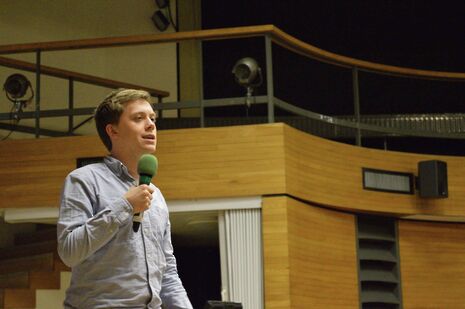Owen Jones rallies student left to Labour
Owen Jones: “I would rather argue a Labour government than fight a Conservative one”

In light of the upcoming election, the Cambridge Universities Labour Club hosted an evening with Guardian columnist Owen Jones on 20th April.
Jones, the author of the bestselling books ‘Chavs: The Demonisation of the Working Class’ and ‘The Establishment – And How They Get Away With It’, reminded students that they are an important electoral demographic in a constituency that is currently a tight Labour-Liberal Democrat contest. The Guardian columnist also made several references to the recent CULC posters mocking the conservative opinions of Katie Hopkins, who, he insisted, is the “most odious individual that has ever lived”.
Jones was quick to criticise the content of the Conservatives’ general election campaign, arguing: “They know they’re going to lose… that’s why they’re so vicious.” According to Jones, this strategy was to blame for the ‘vilification’ of Miliband.
Jones focused heavily on inequality within the UK. The fact that the UK is the sixth largest economy in the world in terms of GDP, yet still has one in four children living in overcrowded accommodation and millions of people on social housing waiting lists, exemplifies, in Jones’ eyes, a government policy of “socialism for the rich, capitalism swim-or-sink for the rest”.
He went on to argue that national rhetoric aimed at vilifying certain social groups, such as immigrants and benefits claimants, was part of an elitist Conservative strategy of “divide and rule”. According to Jones, “They’re saying don’t be angry for being robbed… Be angry at the undeserving neighbour who wasn’t robbed.”
Attacks on the Conservative Party were accompanied by a concerted effort to discredit the policies of the Liberal Democrats. Attendees of the event were called on to “kick out every Lib Dem we can out of all constituencies”. For Jones, the Liberal Democrats’ U-turn on tuition fees in combination with Huppert’s alleged support of the bedroom tax and the privatisation of the NHS, underlined why no Cambridge student should vote Liberal Democrat.
Having analysed the coalition’s policies, Jones readjusted the focus of his speech to explain his support of the Labour Party, despite his frequent criticisms of previous Labour governments. Jones admitted that he would prefer a more left-wing party, however insisted he “would rather argue [with] a Labour government than fight a Conservative one”, a sentiment which elicited applause from the audience.
Jones received further applause when he proposed the necessity of nationalising the UK’s railway network and drew comparisons between Chartists, suffragettes and the creators of the NHS, all of whom he sees as proponents of “progress against the oppressive teeth of the leadership”.
He concluded his speech with the words “let’s stand together, let’s win together and let’s fight this battle together.”
During the question and answer session that followed, concerns about Labour’s tough line on immigration were answered by Jones with a personal story of the help his grandmother received at an NHS hospital by immigrant staff. Jones went further by likening Katie Hopkins’ comments about refugees to the type of rhetoric prevalent under the Nazis and by discrediting UKIP’s credentials as outsider politicians, by claiming they, like many politicians, were privately educated ex-City-boys.
When one audience member asked Jones to estimate the likelihood of an SNP-Labour coalition, he responded by claiming it would be a Tory-DUP-UKIP government that would be the ultimate guarantor of Scottish independence, not a Labour-SNP coalition. According to Jones, the Conservatives are pursuing a “scorched earth tactic” against Scotland and are demonising Sturgeon, which will inevitably lead to a strong Scottish independence movement in the case of a Tory victory.
The Guardian columnist continued by emphasising his support for electoral reform. Jones argued that in the case of a hung parliament or a minority government, the largest party should offer the electorate a referendum on electoral reform.
Theories concerning the link between Labour and the economic crash were dispelled by Jones, who stressed that until 2008, the Conservatives had supported every economic decision that Labour had made.
Jones concluded his visit to Cambridge by criticising inequality in education, advocating a removal of public schools’ charity status and an increase in early education investment. According to Jones, an ‘AAB’ at a state school in an ex-mining village should be seen as equal to an ‘AAAA’ at Eton.
The final words of the evening were uttered by Daniel Zeichner, Labour candidate for Cambridge, who claimed: “If it’s not a Labour victory in Cambridge, it’s a Tory government.”
 News / Caius mourns its tree-mendous loss23 December 2025
News / Caius mourns its tree-mendous loss23 December 2025 Comment / Yes, I’m brown – but I have more important things to say22 December 2025
Comment / Yes, I’m brown – but I have more important things to say22 December 2025 News / Cambridge welcomes UK rejoining the Erasmus scheme20 December 2025
News / Cambridge welcomes UK rejoining the Erasmus scheme20 December 2025 News / CUP announces funding scheme for under-represented academics19 December 2025
News / CUP announces funding scheme for under-represented academics19 December 2025 News / King appoints Peterhouse chaplain to Westminster Abbey22 December 2025
News / King appoints Peterhouse chaplain to Westminster Abbey22 December 2025









